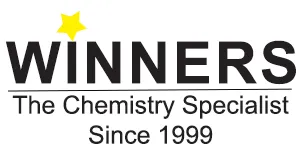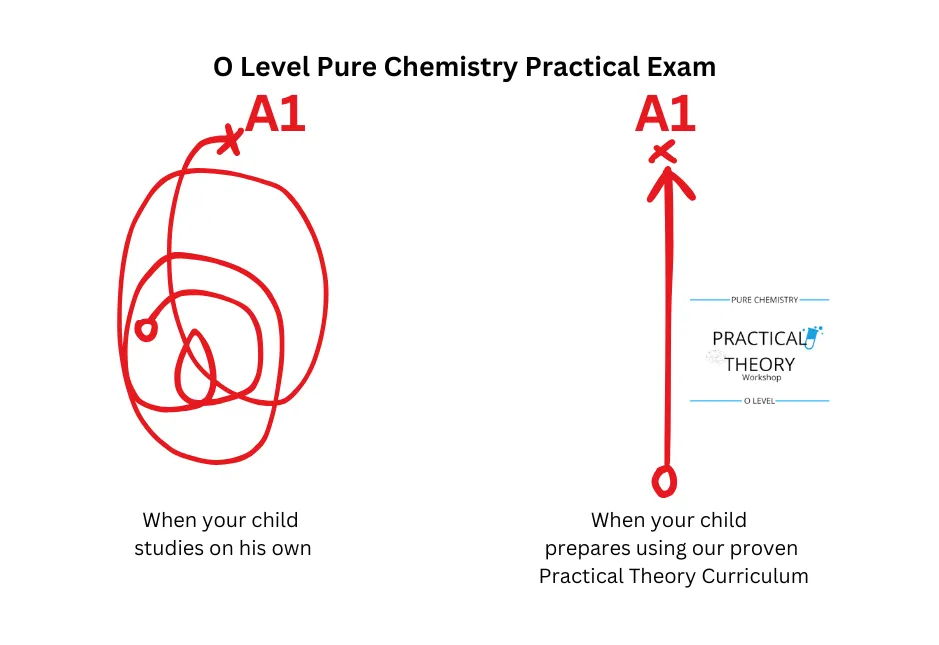
Practical Theory Is The Key to Score A in
Chemistry Practical Exam on 1 Oct 2025

Your child had exposure to hands-on in schools and some even in their tuition centres labs but why is it that they are still failing or barely passing their Chemistry practical exams?
The top 3 challenges students face in their Chemistry practical exam are:
1. They do not know how to answer questions linked to their theory
2. They do not know what to prepare to score better in their practical
3. They feel nervous when an unfamiliar substance is given
Their biggest problem is not hands-on!
With less than 10 days to Pure Chemistry practical exam, your child can study on his own (if he knows how to study) or he can prepare using our proven Practical Theory Curriculum to save time, focus on the essentials, prepare confidently for their practical exam (20% weighting).
"Topics-specific revision" in our curriculum now allows your child to link what they have learnt in Chemistry to their experiments so they don't conduct them blindly anymore.
"10+++ years analysis" will provide your child a crystal-clear overview of what has been commonly tested as well as what they will be tested on. So now they will know what they need to prepare, without feeling nervous of unfamiliar chemicals anymore.
"Planning" will provide your child a structure to follow and answer the question in their practical exam confidently now instead of leaving it blank, not knowing how to even start.
Included are also sample planning questions where Mr Chua shows step by step the thinking process of how he answers the planning questions.
In the section on "Lab Skills", your child will be reminded of the details they need to pay attention to when conducting their experiments and results reporting so that they won't lose these easy marks.
I joined winners education for their o level pure chem final exam boosters after getting a c6 in prelims and losing a lot of confidence as I needed it in my l1r5.
The exam boosters were really helpful and the notes/resources provided were such an essential part of my revision. the tips shared by Mr Chua were very useful and practical, definitely helped me revise in the last few weeks.
I felt a lot more prepared and ready for the exam and Mr Chua even ended up predicting some qns!! ended up getting an a2 and exceeding my o level l1r5 target, thanks to my chem score.
I would 100% recommend it!! the notes, tips and practices were invaluable and really help during the final revision phase. thanks Mr Chua!!
Eve Ang, MGS, C6 to A2
Click on the play video button to learn about how to Answer Planning Question in Chemistry Practical Exam!
O Level Pure Chemistry
Practical Theory Online Curriculum
Taught by Mr Sean Chua, invited 10 Years Series Book Author for O & A Level Chemistry
Fees: $720 $199
Includes: Instant access to the entire Curriculum of Practical Theory Workshop & Notes (pdf)
Curriculum & Notes (pdf)
Section 1: 10++ Years Analysis
Lecture A: Practical Assessments & Requirements (according to SEAB.gov.sg)
Lecture B: 15 Years Practical Exam Analysis
Section 2: Lab Skills
Lecture A: Conceptualising
Lecture B1: Recording Numerical Result
Lecture B2: Recording Observations
Lecture B3: Tips on Recording QA Observations
Lecture C: Graph
Section 3: Topics Specific Revision
Volumetric Analysis Lecture A1.1: Precaution When Performing Experiment
Volumetric Analysis Lecture A1.2: Example: Acid-Alkali / Acid-Carbonate / Redox Titration
Volumetric Analysis Lecture A1.3: Example: Acid-Alkali / Acid-Carbonate Titration
Volumetric Analysis Lecture A1.4: Example: Redox Titration
Volumetric Analysis Lecture A1.5 Example: Redox – Starch Indicator Titration
Volumetric Analysis Lecture A2: Chemical Calculations
Volumetric Analysis Lecture A3: Key Source of Error
Volumetric Analysis Lecture A4: Other Possible Questions
Chemical Energetics Lecture B1: Precaution When Performing Experiment
Chemical Energetics Lecture B2: Plotting Graph of Best Fit
Chemical Energetics Lecture B3: Key Source of Error
Chemical Energetics Lecture B4: Other Possible Questions
Rate of Reaction Lecture C1: Precaution When Performing Experiment
Rate of Reaction Lecture C2: Plotting Graph of Best Fit
Rate of Reaction Lecture C3: Key Source of Error
Lecture D: Simple Separation Techniques
Lecture E: Salt Preparation
Lecture F: Gas Collection
Lecture G: Qualitative Analysis
Lecture H: Datalogger
Section 4: Planning
Lecture A: Skills Tested
Sample Question Lecture B1: Determine % by mass of compound in a sample
Sample Question Lecture B2: Investigate how concentration of acid solutions affects the rate of reaction
Sample Question Lecture B3: Investigate order of reactivity of metals by measuring temperature change
Sample Question Lecture B4: Determine concentration of ethanoic acid in vinegar
Sample Question Lecture B5: Determine % by mass of water in a hydrated salt
Sample Question Lecture B6: How to obtain a pure sample of carbon from a mixture
Sample Question Lecture B7: Determine % by mass of sodium chloride in a mixture
Sample Question Lecture B8: Identify whether a food sample contains a certain substance
Sample Question Lecture B9: Investigate the concentration of sulfate ions in an aqueous solution
Sample Question Lecture B10: Preparation of Salts
Sample Question Lecture B11: Halogen Displacement Reactions
Sample Question Lecture B12: Dilution
"Winners Education is unlike any other tuition. Here I understood the true meaning of chemistry and how it applies to the real world.
Through understanding the reasoning behind why certain things occur as they do, I was able to ace my O levels bringing my grade from a C6 in mid years to an A1 in O levels.
In Winners Education, there is an exceptional way of teaching, one that most school teachers don’t provide. Digging in deep to develop a strong fundamental base through applying concepts- basic to advanced, and truly understanding and not just memorising, is what has brought me to be the chemistry student I am today. If you struggle with chemistry, I highly recommend this centre. I’m sure it will solve all of your problems."
Ishan Singh, Fairfield Methodist Sec Sch, C6 to A1. RI
" Winners supported me in my learning and Mr Chua helped me to gain a better understanding of chem and allowed me to be able to learn many new techniques which allowed me to score better for my chem!
He also made sure to help me with my misunderstandings and prepare us sufficiently for our school/ O level papers. Overall, I enjoyed going to tuition and I felt that I truly developed interest for chem after understanding it better in Winners 🙂
Would recommend Winners to my friends and family!"
Karis Yoo, CHIJ St Nicholas Girls’ Sch, C5 to A1. NYJC
" Mr Chua told us to draw out the experiment before doing it which I felt is very useful and I’ll definitely do that in the practical. The planning questions were useful and a good consolidation for me to revise. There were some things I didn’t know also like rounding the stopwatch timing to zero dp.
The common mistakes part was very useful because I learnt what I didn’t really understand or was not aware of, and now I still remember those mistakes so I thought it was very useful. The structured questions were useful as well as there were some application questions that Mr Chua went through so now I’m a bit more clear on how to approach them."
Christen Foong, Anderson Secondary School, E8 to A1. NYJC